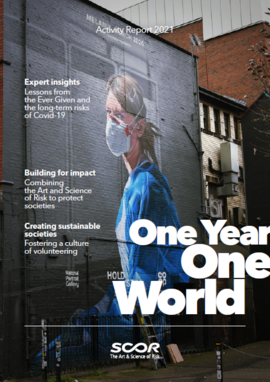Is Long-Covid here to stay?
SCOR's medical experts discuss the lasting impacts of infection
19 mai 2022

More than two years into the Covid-19 pandemic, medical science has delivered many solutions and revealed a breadth of new information on the SARS-CoV-2 virus. However, many questions remain unanswered and new ones continue to emerge. Primary among these is: What are the long-term effects?
While acute illness from Covid-19 has by no means been eradicated, application of the scientific method, evidence-based medicine and randomized controlled trials have led to great advances. Vaccines have been created in a surprisingly short time – which has eased the threat among the vaccinated population – improved techniques for ventilation have been developed, and therapeutics have been repurposed. Yet as the pathogen continues to evolve and mutate into variants, another pressing question remains: How do we deal with the long-term effects of Covid-19?
What is “Long Covid”?
“There is no agreed-upon name for the symptoms that persist after an individual tests positive for SARS-CoV-2,” says Dr. Regina Rosace, VP and Medical Director in SCOR’s Life & Health business unit, “although ‘Long Covid’ is often used.” Likewise, there is no agreed length of time nor specific symptomatology to define this syndrome. Studies attempting to measure or describe Post-Acute Sequelae of SARS CoV-2 infection (PASC) use time intervals that may vary anywhere from 3-4 weeks to more than 12 months post PCR test. Some studies do not even require a positive test, be it PCR, antigen or antibody; rather, they include patients who “think” they have had Covid-19.
Despite these and other difficulties, some information can be gleaned from the data. Those most affected by ongoing symptoms tend to have suffered more severe, acute illness, although mild illness is not completely excluded. The majority affected tend to be in the 35-69 age range, although not the entirety. The most common symptoms are fatigue, shortness of breath, loss of taste and/or smell, difficulty concentrating or brain fog, headaches, trouble sleeping and anxiety. Lingering effects may also include organ dysfunction, residual inflammation, neuropsychiatric symptoms, thrombosis with microangiopathy and the reactivation of another virus. “
“At SCOR we continue to share our expertise and knowledge, advising our clients on underwriting and morbidity linked to Covid-19 as we work to understand its potential outcomes.”
Regina Rosace, MD - VP and Medical Director
All this begs another important question,” says Dr. Rosace: “Compared to what?” The long-term consequences of a Covid-19 infection may depend greatly on the individ- ual’s baseline health, and several groups are attempting to discover a predictor of PASC or a root cause for developing it.
Then there is the question of what to study. Some look at the presence of autoantibodies or of SARS-Cov-2 in the bloodstream, while others look at Epstein-Barr virus reactivation and type 2 diabetes mellitus. Some concentrate on brain fog versus pre-existing cognitive risk factors. Still others examine stool samples and gut microbiota composition over time – certain gut bacteria are known to participate in the regulation of immunology and inflammation.
Most likely, a combination of these mechanisms is behind PASC. Eventually, several different syndromes and mechanisms may be identified, rather than one illness called PASC.
The way forward
“The journey to discover the origins, causes and solutions to the many faces of PASC will not be simple,” emphasizes Dr. Rosace. “The comorbidities of the study group, the existence of a previous or a recurrent infection, or the controls, may greatly affect results, as may the individual’s vaccination status or the length of time since vaccination. Patients diagnosed in early 2020 with Covid-19 may find answers that don’t apply to those with newer strains of SARS-CoV-2, including Omicron. More and more often, people who start the trials without evidence of SARS-CoV-2 infection may later acquire the illness, either with symptoms or without. The determination of which particular variant the individual was infected with may also make it very difficult to generalize among regions or countries.”
Medical professionals are actively sharing knowledge on Covid-19 and its pathophysiol- ogy, epidemiology, treatment, and prognosis. The health (re)insurance industry needs to be part of this knowledge exchange in order to provide solutions that correspond to patients’ needs. Covid-19’s multiple potential impacts on the health of a patient present underwriters with challenges far beyond those previously faced in the industry. In addition, its far- reaching macro consequences extend beyond the virus itself – to healthcare services, the economy, lifestyles, occupations, and freedom of movement, just to name a few. All these factors must be taken into consideration for the continuing application of sound and fair underwriting decisions. Y “At SCOR we continue to share our expertise and knowledge, advising our clients on underwriting and morbidity linked to Covid-19 as we work to understand its potential outcomes.”

